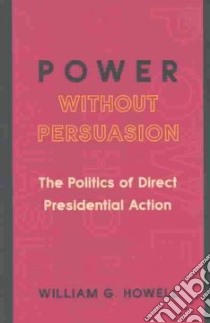Power Without Persuasion - 9780691102702
Un libro in lingua di Howell William G. edito da Princeton Univ Pr, 2003
- € 48.90
- Il prezzo è variabile in funzione del cambio della valuta d’origine
Since the early 1960s, scholarly thinking on the power of U.S. presidents has rested on these words: "Presidential power is the power to persuade." Power, in this formulation, is strictly about bargaining and convincing other political actors to do things the president cannot accomplish alone. Power without Persuasion argues otherwise. Focusing on presidents' ability to act unilaterally, William Howell provides the most theoretically substantial and far-reaching reevaluation of presidential power in many years. He argues that presidents regularly set public policies over vocal objections by Congress, interest groups, and the bureaucracy.
Throughout U.S. history, going back to the Louisiana Purchase and the Emancipation Proclamation, presidents have set landmark policies on their own. More recently, Roosevelt interned Japanese Americans during World War II, Kennedy established the Peace Corps, Johnson got affirmative action underway, Reagan greatly expanded the president's powers of regulatory review, and Clinton extended protections to millions of acres of public lands. Since September 11, Bush has created a new cabinet post and constructed a parallel judicial system to try suspected terrorists.
Howell not only presents numerous new empirical findings but goes well beyond the theoretical scope of previous studies. Drawing richly on game theory and the new institutionalism, he examines the political conditions under which presidents can change policy without congressional or judicial consent. Clearly written, Power without Persuasion asserts a compelling new formulation of presidential power, one whose implications will resound.
Informazioni bibliografiche
- Titolo del Libro in lingua: Power Without Persuasion
- Sottotitolo: The Politics of Direct Presidential Action
- Lingua: English
- Autore: Howell William G.
- Editore: Princeton Univ Pr
- Collana: Princeton Univ Pr (Paperback)
- Data di Pubblicazione: 08 Luglio '03
- Genere: POLITICAL SCIENCE
- Argomenti : Executive orders United States Executive power United States Presidents United States
- Pagine: 280
- Dimensioni mm: 241 x 158 x 19
- ISBN-10: 0691102708
- EAN-13: 9780691102702


